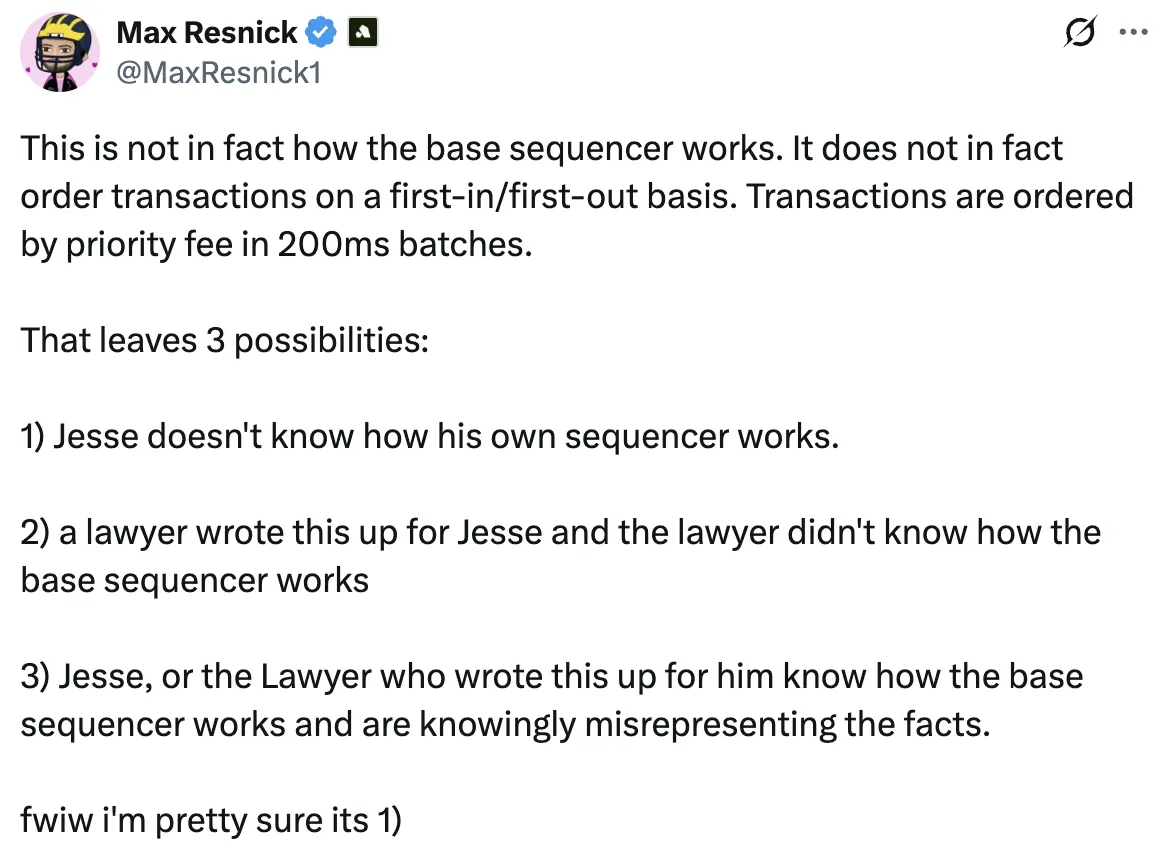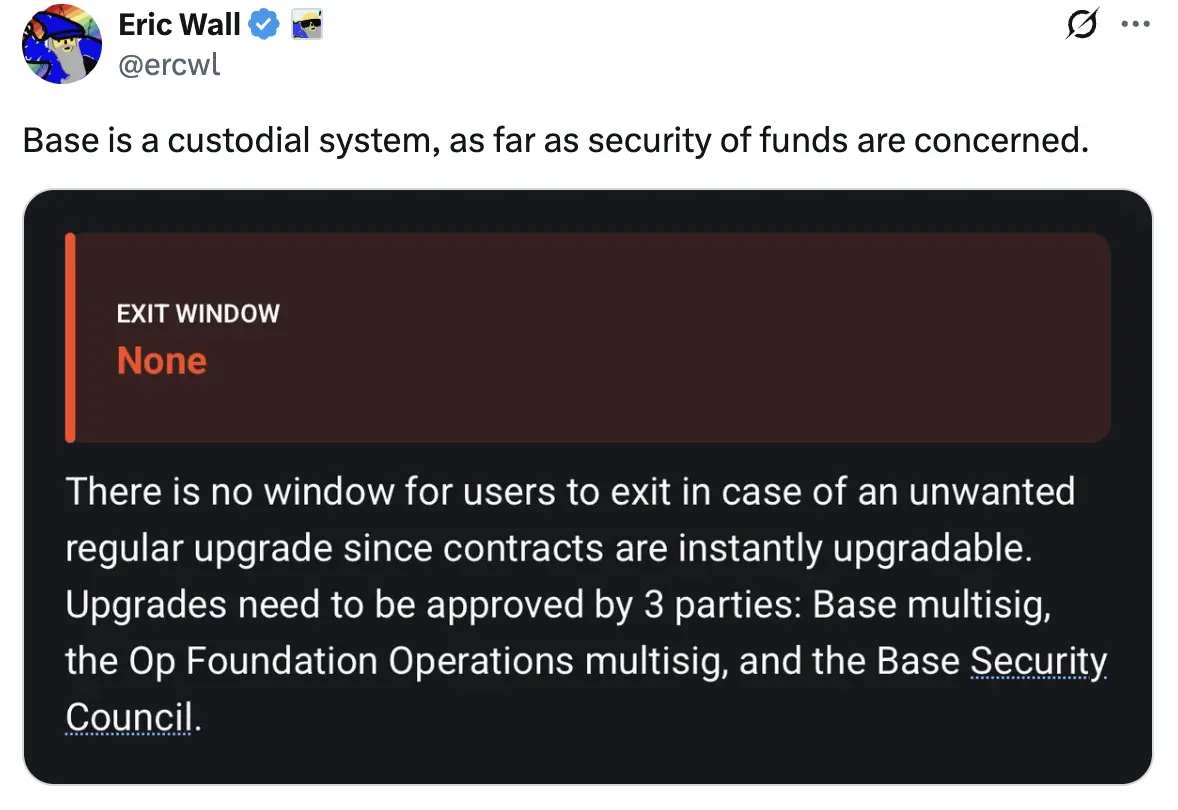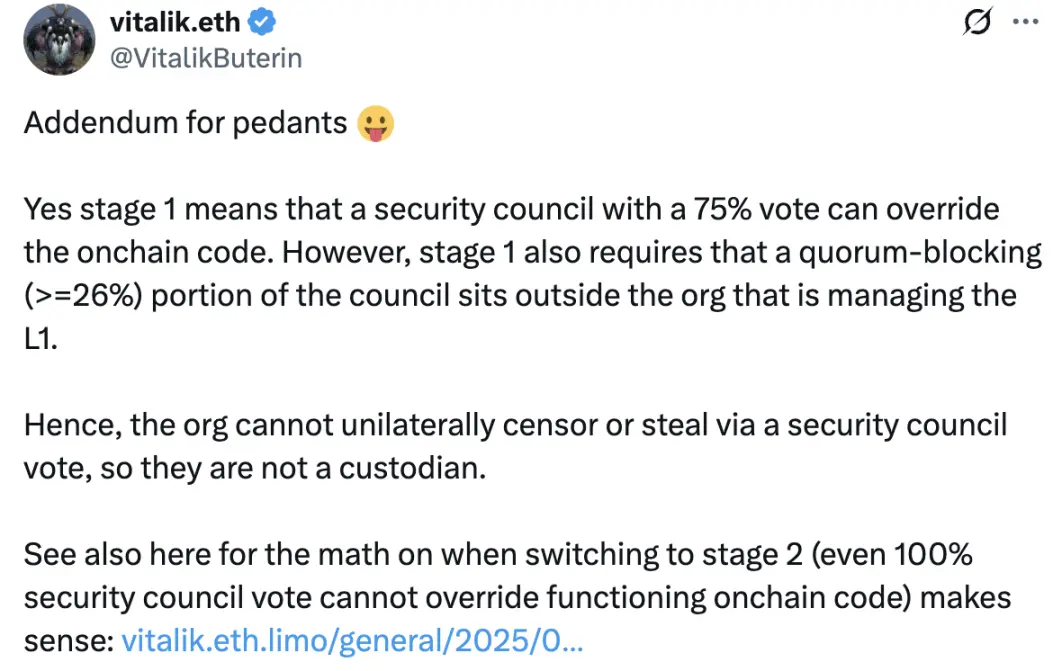Original Author: Eric, Foresight News
Hester Peirce, a commissioner of the U.S. Securities and Exchange Commission (SEC) known as the "crypto mom," stated in "The Gwart Show" that L2s that rely on centralized orderers may fit the SEC's definition of an exchange, meaning operators must register with the SEC and comply with relevant regulations.
Hester Peirce indicated that the key to this judgment is not the technology but the actual functionality. If a single operator controls the matching engine, it is similar to an exchange. To some extent, this means that as long as there is a centralized organization with trading control over L2, that organization must accept SEC oversight.
Initially, this viewpoint did not spark widespread discussion, but as it continued to ferment, many began to worry that if the "crypto-friendly" SEC could reach such a conclusion, the development of L2s might be hindered. Base, which combines elements of both exchanges and L2s, became the primary target.
As the FUD grew louder, Coinbase's Chief Legal Officer Paul Grewal was the first to speak out, stating that the SEC defines an exchange as a market connecting buyers and sellers of securities, while L2 operates as a general blockchain infrastructure that can provide services to on-chain exchanges, much like AWS provides infrastructure to exchanges, but it cannot be said that AWS is an exchange. Paul Grewal believes that mislabeling the orderer could lead to overlooking L2's role in scalability.
Subsequently, Base's head Jesse Pollak also provided an explanation on X regarding the orderer, stating that the orderer collects user transactions and sorts them based on a first-in-first-out principle to calculate the resulting state changes, ultimately consolidating transactions on L1 for settlement, similar to how a traffic controller ensures smooth road flow. Jesse Pollak argued that the orderer does not match orders; the matching of trades occurs at the smart contract level, and the orderer merely ensures that these transactions proceed in a consistent and orderly manner.
Ethereum co-founder Vitalik Buterin joined the discussion after Jesse Pollak, asserting that Base is simply an L2 running on Ethereum, providing a stronger user experience through centralized functions while still closely integrating with Ethereum's decentralized base layer to ensure security. Vitalik emphasized that Base's funds are "non-custodial," meaning that the funds on L2 are ultimately controlled by L1 and cannot be stolen by L2 operators.

Max Resnick, chief economist at Anza, a company focused on Solana development, raised questions regarding Jesse Pollak's statements, indicating that Base's orderer sorts transactions based on priority fees in 200-millisecond intervals, rather than following a first-in-first-out principle. Although Jesse Pollak later clarified this, it was clear that Max Resnick aimed to express that the orderer can reorder transactions according to certain rules, directly pointing to the issue of orderer centralization.

Discussions about whether L2s like Base qualify as exchanges do not yield many differing opinions; the SEC commissioner's view that "L2 is an exchange" may stem from a lack of understanding of L2 architecture. Industry discussions are more driven by regulatory concerns than by right or wrong issues. However, the perspectives of Base stakeholders and Vitalik sparked another layer of discussion: Should the centralization of Base's orderer change?
From Regulatory Issues to the Debate on Orderer Centralization
Vitalik's viewpoint that Base's centralized orderer is for scalability and user experience has also sparked considerable controversy. Eric Wall, co-founder of Taproot Wizards, stated that in terms of fund security, Base is essentially a custodial system and pointed out that Base's contracts can still be upgraded through governance, meaning that operators and their related entities (via a security council) retain significant discretion. In his view, this makes Base functionally closer to a custodial system rather than a fully trust-minimized Ethereum scaling solution. Eric Wall also commented that Vitalik's wording could lead readers to believe that even in the event of key leakage, there would be no loss of funds, which he deemed irresponsible.
Former Ethereum core developer Lane Rettig stated that while Coinbase itself would not maliciously steal user funds, that does not mean Coinbase would not act against user interests under government pressure.

Alex Thorn, head of research at Galaxy, argued that Vitalik's viewpoint missed the point, stating that the focus of the discussion should be on securities on L2, rather than the security of L2 itself. Although Alex Thorn did not explicitly state it, his viewpoint pointed to a very critical issue: L2 itself is not an exchange, but if the trading platforms on L2 are built on a very centralized chain, can these trading platforms still be called DEXs, and should they be regulated?

In response to the growing criticism of Base's centralization, Vitalik reiterated that Base is indeed in a centralized phase, where the absolute majority vote of the security council can upgrade contracts, but he pointed out that quorum rules prevent Coinbase from unilaterally reviewing or stealing funds. Furthermore, even a 100% vote from the security council cannot change the on-chain code that is currently running, and a second phase is already being planned.
The founder of Anastasia Labs, which is developing Cardano L2 Midgard, sharply commented on Vitalik's supplementary remarks, interpreting "security council" as "multi-signature"; "75% vote" as "7 private keys"; and "requiring individuals independent of the organization managing L2 to veto proposals with more than 26% voting power" as "requiring the organization to use shell companies, friends' companies, obfuscated subsidiaries, or partner companies to hold the 3 private keys needed for multi-signature."
Many users in the comments supported the founder of Anastasia Labs' viewpoint, believing that although the rules are set this way, it is very easy to circumvent the rules to achieve complete control over Base, and the opacity of governance makes these transparent rules seem very untrustworthy.
The Regulatory Dilemma of Web 3 Infrastructure
Base's excessive centralization as an L2 has sparked multiple discussions, and the SEC commissioner's viewpoint seems somewhat "absurd," but it also points directly to the core issue: If the transaction ordering on L2 can be manipulated at will, then this L2 should be subject to regulation. Of course, regulating L2 as an exchange may superficially lack basis, but if the operator of L2 controls the orderer to pocket MEV profits and influence transaction execution prices, then L2 does indeed play a role similar to that of a broker to some extent.
For regulatory agencies, determining the "decentralization" of infrastructure is a challenge; even if the orderer achieves decentralization, it is difficult to clarify whether there are conflicts of interest among the entities maintaining the orderer network in a short time. The SEC, concerned about the potential for a repeat of the FTX tragedy due to a lack of regulation, has somewhat relaxed regulations during the new U.S. president's term, but it cannot hide its worries about the significant risks arising from regulatory relaxation. Recently, U.S. regulatory agencies have introduced some exemptions for DeFi, but how to define and review infrastructure remains a question that needs further study.
免责声明:本文章仅代表作者个人观点,不代表本平台的立场和观点。本文章仅供信息分享,不构成对任何人的任何投资建议。用户与作者之间的任何争议,与本平台无关。如网页中刊载的文章或图片涉及侵权,请提供相关的权利证明和身份证明发送邮件到support@aicoin.com,本平台相关工作人员将会进行核查。




